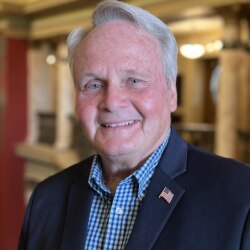A President Who Didn’t Want The Job
"If not for a bullet, the man who least wanted to be president may well have become one of our better ones. Such can be the bitter ironies of history thwarted."
Thank God it’s almost over—the presidential election, that is. Like most people, I’ve been worn out by it for months. Maybe we should take a break and not talk politics for a few weeks, at least.
Though we might want to leave politics alone for a while, be assured that in this age of big government, politics isn’t likely to leave us alone for very long.
But if we must talk politics, how about we focus for a second on a humble U.S. president who never lusted for the job and indeed, didn’t want it at all? One of Montana’s 56 counties is named for him.
I refer to James A. Garfield of Ohio, elected as the country’s 20th President in 1880, almost a decade before Montana became a state.
Garfield is proof that people who don’t lust for public office often make better public servants than those who do. If you truly enjoy wielding power over others, then I don’t want you anywhere near it. It’s refreshing when someone runs for office and doesn’t care so much to have it that he’ll do or say whatever it takes.
Perhaps no other man ever elected to the presidency wanted it less than our 20th. Garfield himself said, “This honor comes to me unsought. I have never had the Presidential fever, not even for a day.” Garfield County here in the Treasure State should be very proud of its name.
A former Civil War general, Garfield was a 48-year-old, nine-term congressman in 1880. He was looking forward to assuming office as a U.S. senator in a few months (having been selected by the Ohio legislature) when he showed up at the Republican National Convention that year in support of John Sherman, a fellow Ohioan.
The GOP convention in 1880 was deadlocked on who to nominate. On the 34th ballot, votes for Garfield prompted the non-candidate to leap to his feet in protest. “I rise to a question of order. No man has a right, without the consent of the person voted for, to announce that person’s name, and vote for him, in this convention. Such consent I have not given!”
The chairman cut Garfield off, gaveled him out of order, and told him to take his seat. The balloting proceeded. On the 36th tally, as Garfield looked on in horror, he won the nomination by a 20-vote margin. Minutes later, over his vigorous objections, his nomination was made unanimous.
Garfield was “shocked and sickened,” reports Candace Millard in her riveting 2011 book, Destiny of the Republic. His first impulse was to ask a friend if he thought it would be inappropriate to leave the building.
He left the convention hall in a carriage, rode to his hotel in silence with “a grave and thoughtful expression on his face,” then later collapsed in a chair and stared at the wall, looking “as pale as death.” The campaign he didn’t want was about to begin, and it ended with a victory in November that he never imagined would happen.
On March 4, 1881, Garfield was sworn in as the 20th president. His inaugural address emphasized the importance of civil rights for recently freed black Americans. “Freedom,” he declared, “can never yield its fullness of blessings so long as the law or its administration places the smallest obstacle in the pathway of any virtuous citizen.”
As a president, Garfield proved honest and competent. He was constantly appalled at the endless lines of people who wanted a favor or a federal job. “Almost everyone who comes to me wants something,” he wrote in frustration. After one very long and exasperating day, he wrote in his diary, “My God! What is there in this place that a man should ever want to get into it?”
Garfield’s positions on many issues are appealing to those who cherish liberty. As a congressman, he refused to support higher tariffs to “protect” locally produced goods at the expense of consumers. He refused to endorse measures to empower the president to suspend habeas corpus. And he was outspokenly anti-inflationist for the entirety of his public career. He called for sound and honest, gold-based money.
Garfield’s presidency lasted only 200 days, and for 80 of those he was unable to govern as he lay wounded from Charles Guiteau’s assassination attempt. He died on September 19, victim of a crazed gunman who, unlike Garfield, did lust for public office and was angry that the president hadn’t offered him one.
If not for a bullet, the man who least wanted to be president may well have become one of our better ones. Such can be the bitter ironies of history thwarted.
*****
Lawrence W. Reed writes a monthly column for the Frontier Institute in Helena, on whose board he serves. He is president emeritus of the Foundation for Economic Education and blogs at www.lawrencewreed.com.
